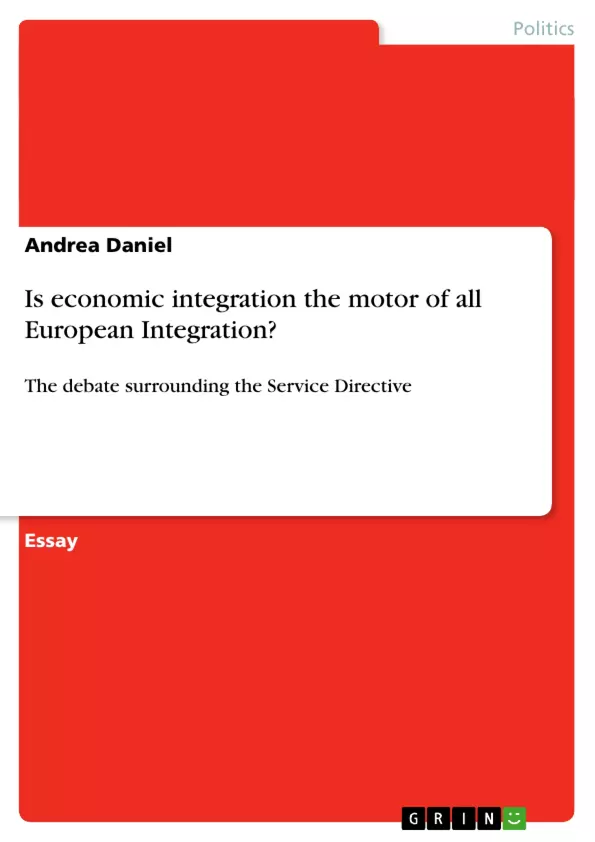The essay analyses the question how EU-legislation on economic integration has shaped policy and decision-making processes as a “motor of political integration”. Economic legislation, although on the first look restricted to one policy area and one “policy mode”, can influence other areas and policy modes. Mainly focused on the example of the “Services Directive” the distribution of power between the EC institutions is analysed. At the same time the limits of economic integration in overcoming other political interests of Member States or interest groups like Trade Unions becomes visible. The Directive is a kind of “model case” of how a legislative act on economic policy can engage other policy fields, like social policy issues, labour market issues etc. At the same time it shows how economic or structural interests shift the political positions of MS as well as of interest groups, with groups which otherwise would form a solid block suddenly pursuing different goals. Therefore the Directive proves to be a good example of the complex multi-layer decision-making process on EC legislation.
[...]
Inhaltsverzeichnis (Table of Contents)
- Introduction
- Economic Integration as the core of European Integration
- The Services Directive - an economic legislation and its consequences
- Background
- Deciding the Services Directive
- The European Commission
- The European Parliament
- The Council
- The hidden power of interest groups
- Conclusion
Zielsetzung und Themenschwerpunkte (Objectives and Key Themes)
This essay examines how European Communities' (EC) legislation on economic integration has influenced policy and decision-making processes, acting as a "motor of political integration". Specifically, it analyzes the power dynamics between EC institutions, using the example of the "Services Directive". It also explores the limitations of economic integration in overcoming the political interests of Member States (MS) and interest groups such as Trade Unions.
- The role of economic integration in driving European political integration.
- The power distribution between EC institutions in the context of the Services Directive.
- The limitations of economic integration in overcoming political interests of Member States and interest groups.
- The complex multi-layer decision-making process of EC legislation.
- The interplay of economic and non-economic policy issues in EU decision-making.
Zusammenfassung der Kapitel (Chapter Summaries)
The first chapter introduces the concept of economic integration as a driving force behind European political integration, highlighting the role of EC legislation in shaping policies and decision-making processes. It argues that economic legislation, while seemingly focused on a single policy area, can have significant influence on other policy fields. The essay focuses on the "Services Directive" as a case study to illustrate the power distribution among EC institutions and the challenges of overcoming political interests of Member States and interest groups.
The second chapter examines the concept of economic integration within the European Union (EU). It defines political integration in terms of MS voluntarily relinquishing their sovereignty to participate in common European policies. It highlights the significance of economic integration in the development of the EU and the role of the "Regulatory Policy Mode" in shaping European legislation, particularly in economic areas.
The third chapter explores the background and consequences of the Services Directive. It examines the situation prior to 2003, where the free movement of goods and capital was relatively advanced in the Single Market, while the freedom of establishment and the free movement of services lagged behind. The chapter also explores the potential for future economic growth in the services sector and the impact of the Services Directive on this area.
Schlüsselwörter (Keywords)
This essay focuses on the relationship between economic integration and European political integration. Key topics include the European Communities (EC) legislation, the "Services Directive", power distribution within the EC institutions, the influence of interest groups, and the interplay between economic and non-economic policy issues in the EU. The essay examines the process of decision-making in the EU, including the role of the "Regulatory Policy Mode" and the limitations of economic integration in overcoming political interests of Member States.
Frequently Asked Questions
Is economic integration the main driver of European integration?
The essay argues that economic legislation acts as a "motor of political integration," influencing various other policy areas like social and labor market issues.
What is the significance of the "Services Directive"?
The Services Directive is a model case showing how economic policy can engage complex social issues and shift political positions of Member States and interest groups.
How does economic integration affect the power of EU institutions?
The analysis shows a complex distribution of power between the European Commission, the Parliament, and the Council during the legislative process.
What are the limits of economic integration in the EU?
Limits arise when economic goals clash with the strong political interests of Member States or the social concerns of interest groups like Trade Unions.
What is the "Regulatory Policy Mode"?
It is a method of EU decision-making that focuses on creating common rules and standards to harmonize the Single Market across Member States.
- Citation du texte
- Andrea Daniel (Auteur), 2009, Is economic integration the motor of all European Integration?, Munich, GRIN Verlag, https://www.grin.com/document/131481



